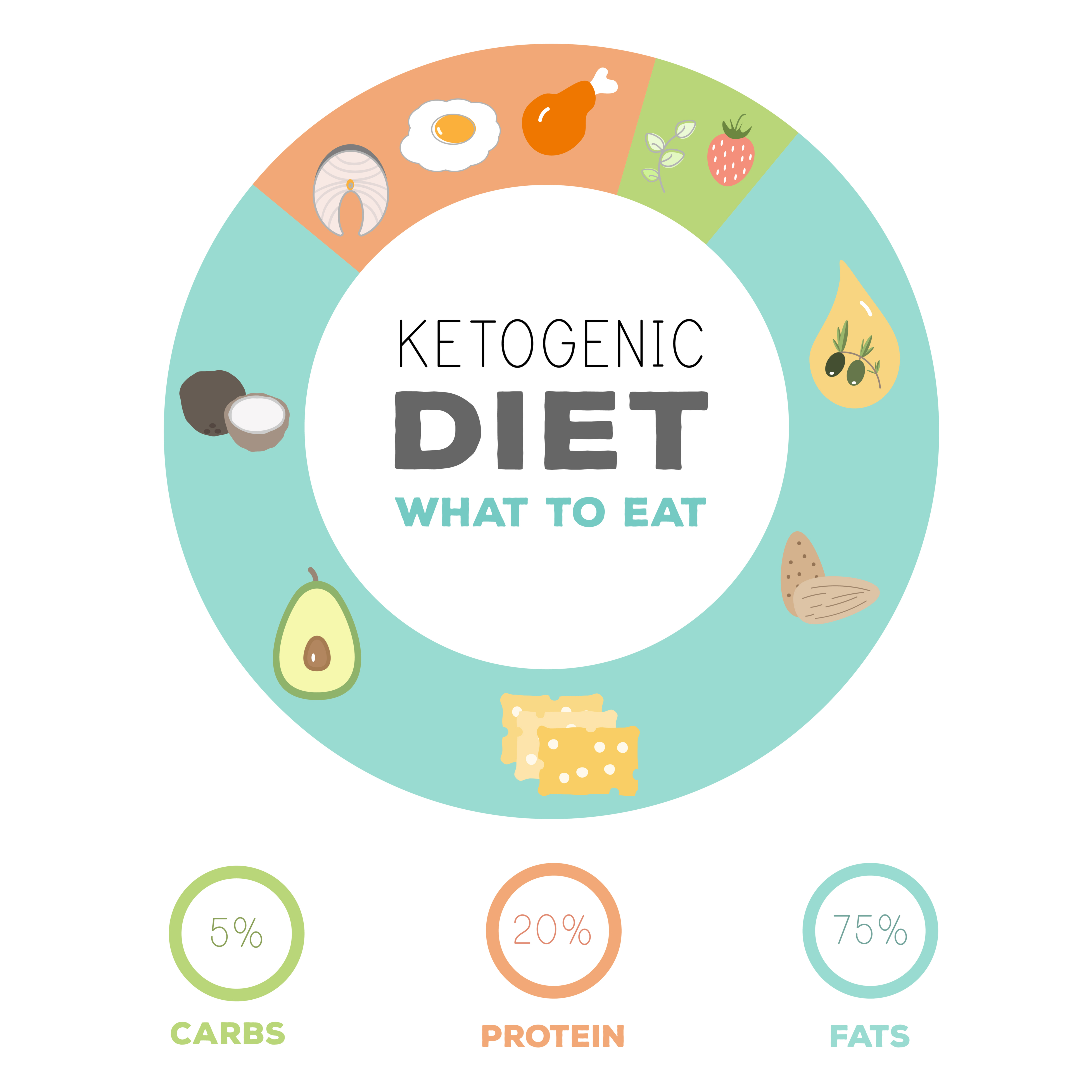Evidence suggests that a ketogenic diet does not affect blood pressure in the long-term but may have a short-term benefit. However, the data is scarce. A ketogenic diet is a style of food intake that reduces the hormone insulin which then promotes the production of ketone bodies from fatty acids.1 It is recommended that 6% – 10% of an individual’s daily calories come from carbohydrates with the remaining 90 – 94% of calories from mostly fat and some protein.2 Studies of its impact on systolic blood pressure (SBP) and diastolic blood pressure (DBP) show a general trend towards a short-term reduction3 but a nonsignificant change long-term.4-9 However, further research is needed as there is a lack of randomized control trials (RCTs) on the ketogenic diet and blood pressure.
A recent systematic review by Castellana et al. analyzed 12 studies that looked at the effects of a very low-calorie ketogenic diet (VLCKD) in overweight and obese individuals.3 The studies had follow-up times ranging from three weeks to two years and compared the VLCKD to a low-calorie diet, a very-low-calorie diet, or a normal diet. In four of the studies (n=199), the authors found that the VLCKD was associated with a significant reduction in SBP of 8.5 mmHg (95% confidence interval [CI] [11.4 – 5.6], p<0.001) and in DBP of 7.2 mmHg (95% CI [8.9 – 5.5], p<0.001). However, only one of these four studies had a follow-up longer than four weeks. Furthermore, the authors cautioned that a positive effect on blood pressure should be expected because the VLCKD was also seen to be associated with weight loss.
An earlier meta-analysis by Bueno et al. specifically examined the long-term effect of the ketogenic diet.4 They analyzed 11 RCTs (n=1,298) with a duration of at least 12 months that compared a very-low-carbohydrate ketogenic diet to a low-fat diet. The authors found that there was no significant difference between the two groups with regards to mean change in SBP. However, there was a significant reduction in DBP of 1.43 mmHg (95% CI [2.49 – 0.37], p=0.008) in favor of the very-low-carbohydrate ketogenic diet.
Nordmann et al. expanded upon these findings by comparing the short-term effects of the diet in addition to the long-term effects.10 They included five trials (n=447) that compared individuals assigned to a low-carbohydrate diet to individuals assigned to a low-fat diet. At the six-month mark, there was a nonsignificant beneficial trend favoring the low-carbohydrate diet with a weighted mean difference in SBP of -2.4 mmHg (95% CI [-4.9 – 0.01]) and in DBP of -1.8 mmHg (95% CI [-3.7 – 0.1]). However, this trend disappeared at the 12-month mark.
Overall, there may be a slight beneficial effect of the ketogenic diet on blood pressure that attenuates in the long-term, but studies on this topic are lacking. Therefore, more rigorous RCTs should be conducted before making substantial conclusions and recommending the ketogenic diet for long-term blood pressure management.
References
- Laffel L. Ketone bodies: a review of physiology, pathophysiology and application of monitoring to diabetes. Diabetes/Metabolism Research and Reviews. 1999;15(6):412-426. doi:https://doi.org/10.1002/(SICI)1520-7560(199911/12)15:6<412::AID-DMRR72>3.0.CO;2-8
- Accurso A, Bernstein RK, Dahlqvist A, et al. Dietary carbohydrate restriction in type 2 diabetes mellitus and metabolic syndrome: time for a critical appraisal. Nutr Metab (Lond). Apr 8 2008;5:9. doi:10.1186/1743-7075-5-9
- Castellana M, Conte E, Cignarelli A, et al. Efficacy and safety of very low calorie ketogenic diet (VLCKD) in patients with overweight and obesity: A systematic review and meta-analysis. Rev Endocr Metab Disord. Mar 2020;21(1):5-16. doi:10.1007/s11154-019-09514-y
- Bueno NB, de Melo IS, de Oliveira SL, da Rocha Ataide T. Very-low-carbohydrate ketogenic diet v. low-fat diet for long-term weight loss: a meta-analysis of randomised controlled trials. Br J Nutr. Oct 2013;110(7):1178-87. doi:10.1017/s0007114513000548
- Cicero AF, Benelli M, Brancaleoni M, Dainelli G, Merlini D, Negri R. Middle and Long-Term Impact of a Very Low-Carbohydrate Ketogenic Diet on Cardiometabolic Factors: A Multi-Center, Cross-Sectional, Clinical Study. High Blood Press Cardiovasc Prev. Dec 2015;22(4):389-94. doi:10.1007/s40292-015-0096-1
- Saslow LR, Kim S, Daubenmier JJ, et al. A randomized pilot trial of a moderate carbohydrate diet compared to a very low carbohydrate diet in overweight or obese individuals with type 2 diabetes mellitus or prediabetes. PLoS One. 2014;9(4):e91027. doi:10.1371/journal.pone.0091027
- Özdemir R, Güzel O, Küçük M, et al. The Effect of the Ketogenic Diet on the Vascular Structure and Functions in Children With Intractable Epilepsy. Pediatr Neurol. Mar 2016;56:30-34. doi:10.1016/j.pediatrneurol.2015.10.017
- Heussinger N, Della Marina A, Beyerlein A, et al. 10 patients, 10 years - Long term follow-up of cardiovascular risk factors in Glut1 deficiency treated with ketogenic diet therapies: A prospective, multicenter case series. Clin Nutr. Dec 2018;37(6 Pt A):2246-2251. doi:10.1016/j.clnu.2017.11.001
- Saslow LR, Daubenmier JJ, Moskowitz JT, et al. Twelve-month outcomes of a randomized trial of a moderate-carbohydrate versus very low-carbohydrate diet in overweight adults with type 2 diabetes mellitus or prediabetes. Nutr Diabetes. Dec 21 2017;7(12):304. doi:10.1038/s41387-017-0006-9
- Nordmann AJ, Nordmann A, Briel M, et al. Effects of low-carbohydrate vs low-fat diets on weight loss and cardiovascular risk factors: a meta-analysis of randomized controlled trials. Arch Intern Med. Feb 13 2006;166(3):285-93. doi:10.1001/archinte.166.3.285

.png)

